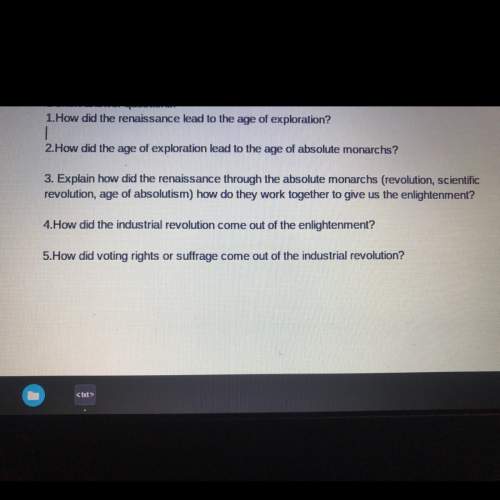
History, 16.12.2020 20:50 chynaroyal19
Our constitution does not copy the laws of neighbouring states; we are rather a pattern to others than imitators ourselves. Its administration favours the many instead of the few; this is why it is called a democracy. If we look to the laws, they afford equal justice to all in their private differences; if no social standing, advancement in public life falls to reputation for capacity, class considerations not being allowed to interfere with merit; nor again does poverty bar the way, if a man is able to serve the state, he is not hindered by the obscurity of his condition. The freedom which we enjoy in our government extends also to our ordinary life. There, far from exercising a jealous surveillance over each other, we do not feel called upon to be angry with our neighbour for doing what he likes, or even to indulge in those injurious looks which cannot fail to be offensive, although they inflict no positive penalty. But all this ease in our private relations does not make us lawless as citizens. –Funeral Oration, Pericles Which excerpt from the passage is an opinion? “Our constitution does not copy the laws of neighbouring states” “The freedom which we enjoy in our government extends also to our ordinary life.” “they afford equal justice to all in their private differences” “we do not feel called upon to be angry with our neighbour for doing what he likes” it is D

Answers: 2
Another question on History

History, 21.06.2019 20:00
The constitution protects the rights of citizens by limiting the power of government
Answers: 2

History, 21.06.2019 22:30
Match the vocabulary word with its meaning. 1. capitalism to change or improve something by correcting faults or removing abuses 2. chattel an economic system based on private ownership and competition motivated by profit 3. imperialism policy extending political, economic, or military rule over another 4. indentured an economic system where colonies supply goods to the mother country 5. mercantilism an agreement committing one person to be another's slave for a certain period of time 6. reform a type of slavery where the slave is the sole property of the master with no rights
Answers: 1

History, 22.06.2019 05:30
Explain the first meeting between robespierre and louis xvi after louis is crowned king? fast
Answers: 3

History, 22.06.2019 08:30
The edict of nantes states a: protestantism was to be the official religion in france b: huguenots would rules france and allow catholics to practice freely. c: catholicism was to be the official religion in france but protestants could worship freely. d: catholicism was to be the official religion in france and protestantism was to be outlawed.
Answers: 1
You know the right answer?
Our constitution does not copy the laws of neighbouring states; we are rather a pattern to others th...
Questions









Physics, 09.08.2019 01:20


Physics, 09.08.2019 01:20

Physics, 09.08.2019 01:20







Physics, 09.08.2019 01:20

Physics, 09.08.2019 01:20




